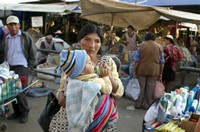Rutgers' Cultural Anthropologists Tie Global Processes to Everyday Lives

The cultural anthropology program at Rutgers is built on anthropology's traditional study of peoples, cultures and languages. It is dedicated to cross-cultural understanding and is committed to field work. The Department of Anthropology has created the Program in Critical Interventions in Theory and Ethnography to explore, with other units of the university, the questions of difference, inequality and justice on a global scale, but in local contexts.



Angelique Haugerud has spent nearly three decades conducting field work in Kenya, but the true focus of her work is the meaning of "rich" and "poor" in widely different and rapidly changing societies -- rural Kenya, and the United States. She has followed the lives of hundreds of Kenyans -- including the children and grandchildren of people she first met as a student many years ago -- to understand how they deal with the local effects of globalization, and what they mean when they describe wealth or poverty. Recently, Haugerud has focused on the the meaning of the same concepts iin the United States, where issues of social class have long been difficult to discuss. Read more.

David Hughes, whose work has been focused on Zimbabwe and Mozambique, studies the relationship between people and the land they live on. In particular, he studies how people from very different cultures -- in this case, African peasants and European immigrants -- view and think about and act on the same land and landscape. He is also interested in how European views of Africa have shaped the the use of the land under colonial and independent governments. Read more.

Dorothy Hodgson explores the meaning of ethnic and gender identity in a rapidly changing society -- the Maasai in Tanzania. She has concluded after nearly two decades of work among the Maasai that 80 years of well-meaning "development" work has made those issues -- and therefore, the business of everyday life -- more complicated, rather than less. Maasai people, Hodgson shows in her work, are not coffee-table curiosities or icons of "primitive" Africa, but three-dimensional men and women grappling with what it means to be a Maasai man or woman, with what it means to be Maasai in the modern Tanzanian state, and with the daily business of survival in a world where virtually no one is untouched by globalization. Read more.
Other distinguished cultural anthropologists in the Department of Anthropology are:


Parvis Ghassem-Fachandi is interested in ethnicity, religion, violence, sacrifice, ritual, media, Hindu nationalism in Gibraltar, the United States and India.
Fran Mascia-Lees, chair of the Department of Anthropology, studies the body and consumer culture, focusing both on the politics of the representation, display, and commodification of bodies marked by "difference" and on contemporary aesthetic consumption focused on the body and its role in the effective accomplishment of everyday life.

Ana Ramos-Zayas studies the politics of citizenship, race, space, and youth culture in U.S. Latino and Latin American migrant communities. She is the author of National Performances (U of Chicago Press, 2003) and co-author of Latino Crossings (Routledge, 2003). Her current work focuses the intersection of race and emotion among Brazilian and Puerto Rican youth in Newark, New Jersey, Belo Horizote, Brazil, and Santurce, Puerto Rico.
Media Contact: Ken Branson
732-932-7084, ext. 633
E-mail: kbranson@ur.rutgers.edu